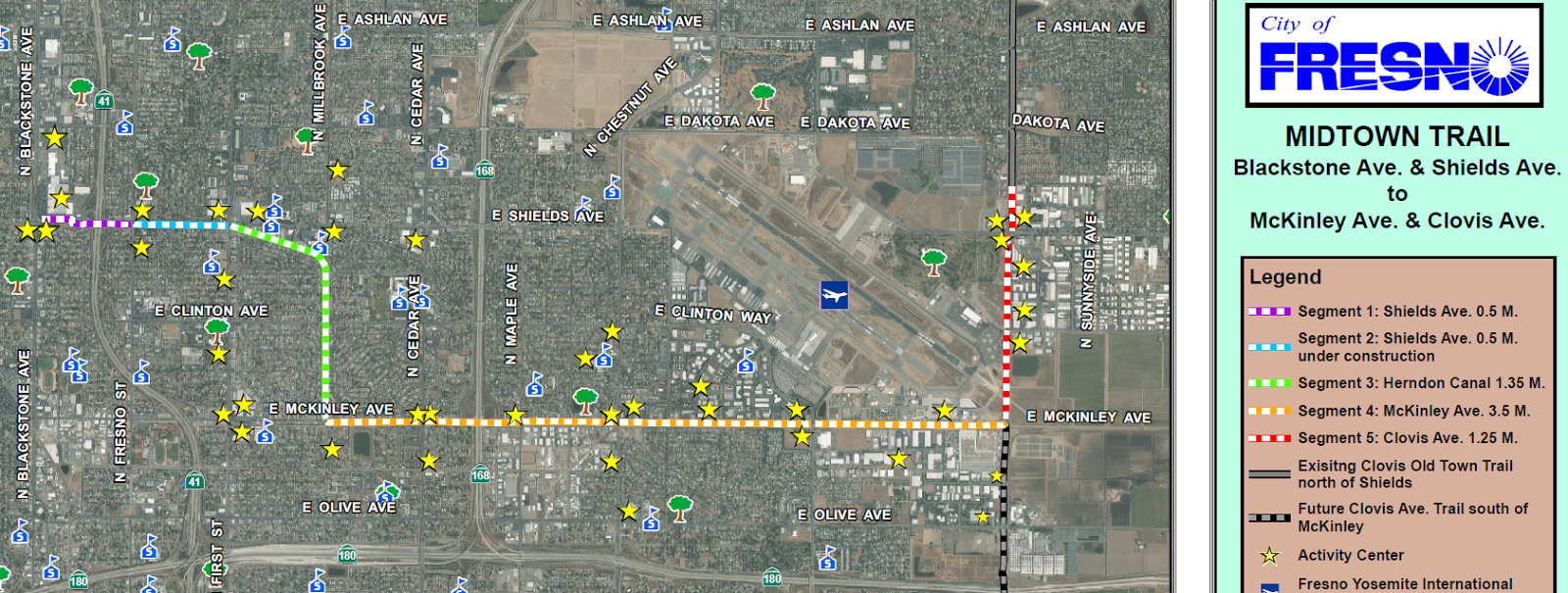Earlier this moth, the Fresno Council of Governments (COG), announced five finalists to receive state funding for projects in the Central Valley through its Active Transportation Program (ATP). The ATP is a state program created to fund projects to make communities safer and more comfortable for people traveling without cars. Projects approved by the COG's are almost always those selected by the state at a later date.
The projects selected for funding by FresnoCOG are mainly infrastructure projects, including constructing new sidewalks and installing curb ramps. Two projects on the list, both located in the city of Fresno, will help fund pedestrian improvements for two long-awaited yet controversial projects.
The city of Fresno’s application to improve pedestrian intersections along its Bus Rapid Transit route was awarded $1.15 million, almost half of the $2.7 million available for the Fresno COG regional ATP awards. According to Mark Standriff, public information officer for the city, the funds will replace the pedestrian signal heads that read walk/don’t walk with countdown signals along 13.5 miles of the corridor.
Construction on the $54 million FAX ‘Q’ line started this past summer. Once completed, the Bus Rapid Transit line will span 15.7 miles and feature 27 stops connecting Fresno’s major north-south corridor, Blackstone Avenue, with a major east-west corridor, Ventura Avenue and Kings Canyon Road, through downtown Fresno. The Q will launch this fall and is expected to cut down on travel time for passengers by offering off-board fare purchase, fewer stops, and priority at traffic signals, according to the official website.
The second project funded by the regional portion of the ATP will close a half-mile gap of the Midtown Trail, a seven-mile bike trail that will connect central Fresno with the existing Old Town Clovis and Sugar Pine trails in North Fresno. The completed trail will total 17 miles. The project, located westbound of Shields Ave and running east from Blackstone to Fresno Street, was awarded the second largest chunk of funds, $665,000. It will be used to pave paths and install drought tolerant landscaping and irrigation, along with signage and striping.
Both projects have been marred in the process of drawn-out debates over their usefulness and funding. In 2014, anti-BRT forces almost killed the bus route, and even after some retooling, ‘Q’ is far from a true bus rapid transit system.
To fund the Midtown Trail, the city of Fresno borrowed $4.6 million from its share of Fresno County Transit Authority Measure C Trails funds. The funding agreement would withhold future trail funding until the loan is paid in full with interest. Advocates questioned the move because the city would not be able to use Measure C money to build trails until 2021, and the usefulness of the trail for improving air quality or increasing active transportation is dubious. But others heralded it as providing much-needed recreation space, particularly in underserved communities.
Esther Postiglione, program manager at Cultiva La Salud, a local health equity advocacy organization, had pointed out in a previous interview that the trail runs parallel to McKinley Canal in central South Fresno, and that would be the closest entry to the trail system for folks who live in South Fresno. She notes that the trail will connect to Blackstone Avenue, where the BRT is supposed to run, and that would benefit the local community. “We are working to making [the entry to the trail] a priority.”
Fresno COG received a total of twenty applications for its regional funding. Ten of those been submitted for funding under the statewide program, including the BRT and Midtown Trail pedestrian projects, but were not selected in December when those awards were allocated.
Two of the successful applications are Safe Routes to Schools projects. The city of Coalinga will receive $340,000 to construct more than 19,000 square feet of sidewalk and curb ramps around its schools. Sean Brewer, community development director for the city of Coalinga, said the sidewalk project will benefit its six K-12 schools, which are located in close proximity to each other.
This is the third funding award Coalinga has received from the regional portion of the Active Transportation Program. Brewer said the city has never been successful in the statewide competition, but are hoping that. as it finalizes its own separate Active Transportation Plan, Coalinga could be in a better position to compete in the future for statewide grants along with larger, urban areas.
“Our goal is being able to get those kids to school a little bit safer,” he said.
A full list of recommendations can be found at the Fresno COG website. Once the projects are approved by the state, funding will become available in July of 2019 and will remain available for three years. For more information on the ATP program, visit the Caltrans website, here.






